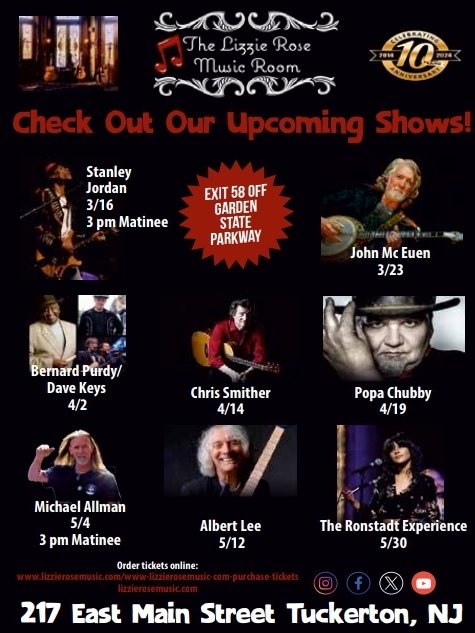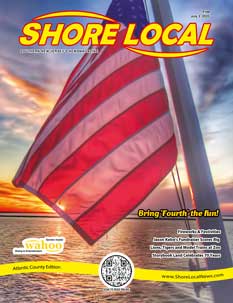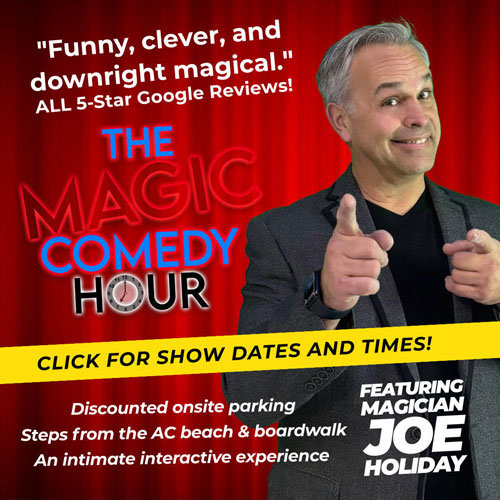By Bruce Klauber
Wednesday, Oct. 7, 1987, was truly a grand night on the Atlantic City Boardwalk. It was a celebration that rivaled any Boardwalk event, the Easter and Saint Patrick’s Day parades and included, for sheer excitement and star power.
The stars were Jerry Lewis, Sammy Davis, Jr., and Frank Sinatra. The event celebrated the change in name and ownership of the storied Golden Nugget Hotel Casino to Bally’s Grand.
In 1980, hotel/casino visionary Steve Wynn opened the Golden Nugget on the Boardwalk at Boston Avenue, on the site of the old Strand Motel. When Wynn built the Golden Nugget, the only casinos in operation in Atlantic City were Resorts, Caesars, Bally’s Park Place and the Brighton (later the Sands).
When the Nugget opened for business on Dec. 12, 1980, nothing in Atlantic City rivaled it in terms of elegance. The biggest names in show business chose to work there.
Frankie Randall, a superb pianist, singer, and colleague of Frank Sinatra’s, was also an industry professional who really knew show business. Randall, who died in 2014, shared Wynn’s vision about everything – from the restaurants to the rooms to the entertainment – being the best, so it was no surprise when Wynn brought Randall aboard to book the talent.
And book it he did. Using his industry connections, he brought Sinatra and various others to the Nugget from Resorts. He also packed the Nugget’s Elaine’s Lounge with the best talent including Keely Smith, Billy Daniels, Buddy Greco, Frank D’Rone, Billy Eckstine and many others. The Nugget became the place to go, and despite its relatively small size, quickly became Atlantic City’s top-grossing hotel/casino.
Wynn, who also owned the Nugget in Las Vegas where he turned what was a modest, downtown venue into the first Vegas property to get four stars from the Mobil Travel Guide, eventually learned that Atlantic City is not Las Vegas. The party line was that Wynn was frustrated with the New Jersey gaming regulators, so he sold the Nugget to Bally’s Grand in 1987, vowing never to return to Atlantic City. Though he’s floated the idea of coming back from time to time, it has not happened, and it’s doubtful that it ever will happen considering that Wynn is now 82 years old.
When the ownership change happened, the powers-that-be at the Bally’s Corporation, a company which had been in the casino business for years, were smart enough to retain key personnel from the Nugget, including Randall. Bally’s realized that the whole name changing thing could be a memorable event, so they wisely assigned Randall, whom they knew could use his connections and show business savvy to put the whole thing together.
His first order of business was to hire the talent. In short order he had commitments from Frank Sinatra and Sammy Davis, Jr., who were on the Nugget’s talent roster, with an assist from Jerry Lewis, who would go anywhere Frank and Sammy were.
Then there was the setting: The Nugget showroom was notoriously small, but he realized he had access to what would become the outdoor Bally’s Grandstand adjoining the hotel, a facility which could seat much more and was already wired for audio and video. The only variable was the weather. If it rained or if Oct. 7 turned out to be too cold, there would be a problem. Still, he forged ahead.
Given that he had commitments from three of the biggest names in show business in hand, and that this was a major industry event, Bally’s and Randall made the decision to broadcast the event via closed circuit television. (This was not broadcast on standard cable television systems).
Randall had one more idea which, if he could pull it off, would be spectacular. Thinking about the name, Bally’s Grand, and coupling that with the lyrics from the standard song, “A Grand Night for Singing,” he asked himself, “What else is grand?” The answer? A “grand” piano of course.
Randall, who always thought big, took his concept a step beyond; actually, 10 steps beyond. He would have 10 white, baby grand pianos on the Atlantic City Boardwalk, led by jazz piano legend, George Shearing, all playing, “It’s a Grand Night for Singing” at the moment Randall gave the signal.
Randall was always interested in young, up-and-coming pianists, perhaps remembering the days when he played piano at Sinatra’s favorite New York City haunt, Jilly’s, shortly after he graduated from Fairleigh Dickinson University. Given that he wanted to give other, younger pianists a chance at national exposure (remember, he needed nine more pianists), he used his contacts in the music departments at area colleges in hopes of getting their finest piano students to participate. His idea worked and he secured commitments for pianists from Temple, Drexel, Glassboro (now Rowan), the University of the Arts and various other schools.
That’s when I got the call. I knew Frankie Randall very well in those days. Randall knew that, in addition to my writing and work as a jazz musician, I was also a board member of the venerable Combs College of Music in Philadelphia, then 100 years old, and noted being the first college in the nation to offer courses in music therapy. He told me what he was doing and asked me if I had a pianist for the event.
With an assist from Combs President Frank DiBussolo, PhD; we convinced one of our more brilliant department heads, Darryl Hobson-Byrd, PhD; to participate. Though the student pianists were offered no straight compensation for their services, they were offered a hotel suite for the night with all expenses paid. Though Darryl, rest his soul, was a classical pianist, he would have no trouble reading the music to, “It’s a Grand Night for Singing,” and jumped at the chance.
I was on hand at the Bally’s Grandstand, and surrounding locations, from the day before until the day after the event, just to make sure that our star Combs College participant was taken care of. Everything came off beautifully, and the event itself was the memorable occasion that Frankie Randall had hoped for.
He couldn’t do enough for everyone associated with the event. During the actual show, I was under the grandstand and hanging with various band members, as well as Frank, Sammy and Jerry. Frankie Randall was running around saying, “Can I get you anything? Can I do anything for you?” the entire time.
Elaine’s Lounge was mobbed after the event’s fireworks climax, and everyone that had been a part of the event as a participant or spectator, agreed that it was indeed a grand night.
After that evening, nothing changed much for a while at what was then being called Bally’s Grand. But the excitement and electricity generated that night, and during the heady Golden Nugget days, didn’t last.
Eventually Frank Sinatra and other performers who first came to the hotel/casino because of Steve Wynn and Frankie Randall, jumped ship and signed with the highest bidder. Sinatra, for example, went to the Sands. And little by little, the hotel/casinos were cutting back on live entertainment altogether.
In 1996, the Hilton Hotel chain bought Bally’s Entertainment, and the name was changed again, this time to the Atlantic City Hilton. That lasted until around 2011, when it changed hands again and became the Atlantic Club Casino Hotel. The idea at Atlantic Club was to appeal to the locals using the catch line, “A casino for the rest of us.” It didn’t work. No one could figure out who “the rest of us” were. The Atlantic Club limped along until it closed on Jan. 13, 2014.
Despite reports over the years that the building would be turned into a condominium/hotel, a gigantic water park, or even housing for Stockton University students, the facility has remained an empty eyesore for more than 10 years.
Sadly, it is no longer grand.
Bruce Klauber is the author of four books, an award-winning music journalist, concert and record producer and publicist, producer of the Warner Brothers and Hudson Music “Jazz Legends” film series, and performs both as a drummer and vocalist.

















